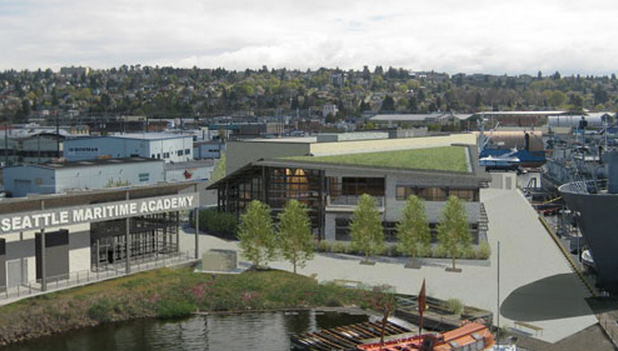Expanded Maritime Academy will better prepare students for a growing industry

Seattle’s booming Maritime industry will face a labor shortage in the next few years as much of its aging workforce retires. To address this need, the Seattle Maritime Academy (SMA) at Seattle Central College recently broke ground on a new, advanced facility. When it opens in late 2016, the new building on the Ballard campus will enable the Academy to greatly expand its existing programs and offer a variety of new ones to better address the needs of this growing industry.
“This state-of-the-art facility will be the premier spot for maritime education in the Pacific Northwest,” said Matthew von Ruden, director of the academy.
The existing 40-year-old facility is currently operating at capacity, with 36 students in its Marine Engineering Technology program. The new 24,000-square-foot building, constructed sustainably and expected to achieve Silver LEED Certification, will drastically increase this capacity by enrolling up to 150 students in an expanded range of programs.
“The building itself will provide the capacity, but identifying and developing the right curricula based on input from our industry stakeholders will be key,” von Ruden said, “the new facility will also provide great opportunities for partnering with industry and other maritime training organizations.”
The industry is not only growing at a rate of about 6.4 percent per year, but according to von Ruden, it is also demanding an increasing number of individuals with higher-level engineering credentials. These positions are more lucrative, but also require a significant amount of more specific training. Currently, von Ruden is working with the academy’s Technical Advisory Committee, comprised of professionals from various maritime niches, to identify and develop programs to develop these higher-level skills through classroom instruction, laboratory exercises, simulation and afloat training.
The expanded campus will also modernize how students learn. The new facility will include laboratories for diesel engines, refrigeration, and hydraulics, as well as simulation laboratories for individual and team training. The academy plans to offer more flexible training options to enable current mariners to advance their careers with advanced merchant credentials.
“We hope the renovated campus will be a place where people can return to advance their skillset,” von Ruden said.